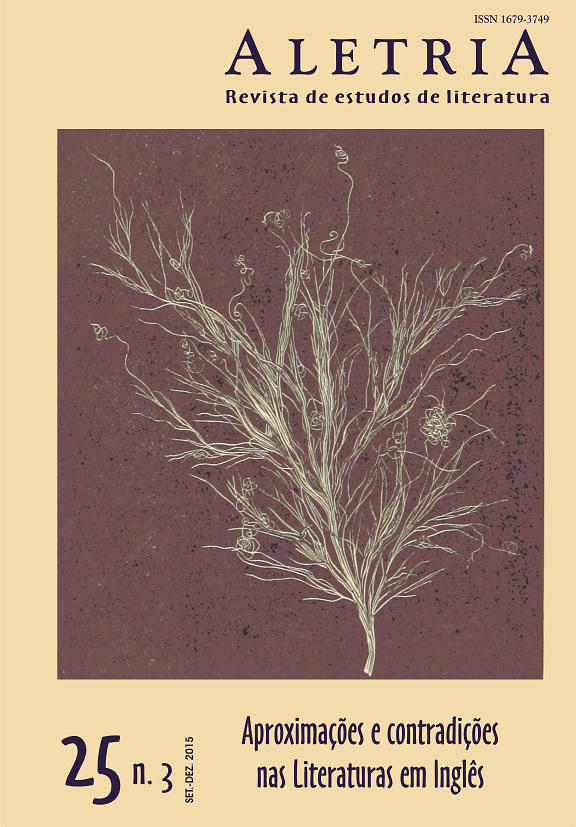Identity and Displacement in the Tales “Liberdade Adiada” and “Segurança”
DOI:
https://doi.org/10.17851/2317-2096.25.3.205-224Keywords:
displacement, space, identityAbstract
This paper discusses the Liberdade Adiada tales, the cape verdean author Dina Salústio, and “Segurança”, the portuguese Teolinda Gersão. In “Liberdade Adiada”, the character moves permanently, performing a daily route for basic survival needs. This impulse is given by charges of a context unfavorable and unjust economic partner that is imposed on the character. In the text Teolinda Gersão, the character displacement occurs in the context of large modern cities in which everything revolves around the capital. Taken by a permanent malaise, the character travels and performs movements that are repeated several times in the narrative, referring not to the pleasure of a moment of relaxation and entertainment, but at a constant restlessness. It is noticed that both characters seem to be related to the processes undertaken by the capitalist modernity, to the extent that the various spaces in which they live, as well as their respective identities, are deeply affected.
Downloads
References
ALVES, Henrique Roriz Aarestrup. Corpos andarilhos nos romances O rei de Havana, de Pedro Juan Gutiérrez, e A fúria do corpo, de João Gilberto Noll. 2008, 221fls Tese (Doutorado) – Pontifícia Universidade Católica de Minas Gerais, Belo Horizonte, 2008.
BAUMAN, Zygmunt. Modernidade e ambivalência. Trad. Marcus Penchel. Rio de Janeiro: Zahar, 1999.
BAUMAN, Zygmunt. Modernidade líquida. Trad. Plínio Dentzien. Rio de Janeiro: Zahar, 2001.
CARREIRA, António. Cabo Verde (aspectos sociais, secas, e fomes do século XX). 2. Ed. Lisboa: Ulmeiro, 1984.
CHEVALIER, Jean. Dicionário de símbolos. 7. ed. Trad. Vera da Costa e Silva. Rio de Janeiro: José Olympio, 1993.
DE CERTEAU, Michel. A invenção do cotidiano: 1. Artes de fazer. Trad. Ephraim Ferreira Alves. Petrópolis: Vozes, 1994.
FILHO, João Lopes. Introdução à cultura cabo-verdiana. Praia: Instituto Superior de Educação, 2003.
FILHO, João Lopes. Cabo Verde retalhos do quotidiano. Lisboa: Caminho, 1995.
FREUD, Sigmund. O mal-estar na civilização. In: Edição standard brasileira das obras psicológicas completas de Sigmund Freud. Trad. Christiano Monteiro Oiticica. Rio de Janeiro. Imago Editora, 1974. v. XXI.
GERSÃO, Teolinda. Segurança. In: LIMA, Isabel Pires de (Coord.). Vozes e olhares no feminino. Porto: Edições Afrontamento, 2001.
HALL, Stuart. A identidade cultural na pós-modernidade. Trad. Tomaz Tadeu de Silva. Rio de Janeiro: DP&A Edições, 2001.
LIPOVETSKY, Gilles. As marcas se tornaram o sentido da vida das pessoas. Revista Cult, n. 120, p. 10-17, dez. 2007.
RODRIGUES, Andréa Alves. A ironia nos contos “Praça de Londres” e “Segurança”. In: DUARTE, Lélia Parreira (Org.). Cadernos Cespuc de Pesquisa. Ironia e humor na literatura portuguesa: esvaziamento do mito e saber da escrita. Belo Horizonte: Pontifícia Universidade Católica de Minas Gerais, 2003. (Série Ensaios n. 12).
RODRIGUES, José Carlos. Tabu do corpo. Rio de Janeiro: Editora Fiocruz, 2006.
RODRIGUES, José Carlos. Tabu da morte. Rio de Janeiro: Editora Fiocruz, 2006.
SALÚSTIO, Dina. Liberdade adiada. In: SALÚSTIO, Dina. Morna eram as noites. Praia: Instituto da Biblioteca Nacional, 2002.
SALÚSTIO, Dina. Insularidade na literatura Cabo-verdiana. In: VEIGA, Manuel (Coord.). Cabo Verde insularidade e literatura. Paris: Éditions Karthala, 1998.
SARAIVA, Antonio José; LOPES, Oscar. História da literatura portuguesa. 17. ed. Porto: Porto Editora, 2008.
SILVA, T. V. Tradições orais: antes e depois da independência. In: VEIGA, Manuel (Coord.). Cabo Verde insularidade e literatura. Paris: Éditions Karthala, 1998.
Downloads
Published
Issue
Section
License
Copyright (c) 2016 Henrique Roriz Aarestrup Alves, Kelly Pellizari (Autor)

This work is licensed under a Creative Commons Attribution 4.0 International License.
Authors who publish with this journal agree to the following terms:Authors retain copyright and grant the journal right of first publication with the work simultaneously licensed under a Creative Commons Attribution Non-Commercial No Derivatives License that allows others to share the work with an acknowledgement of the work's authorship and initial publication in this journal.Authors are able to enter into separate, additional contractual arrangements for the non-exclusive distribution of the journal's published version of the work (e.g., post it to an institutional repository or publish it in a book), with an acknowledgement of its initial publication in this journal.Authors are permitted and encouraged to post their work online (e.g., in institutional repositories or on their website) prior to and during the submission process, as it can lead to productive exchanges, as well as earlier and greater citation of published work (See The Effect of Open Access).









